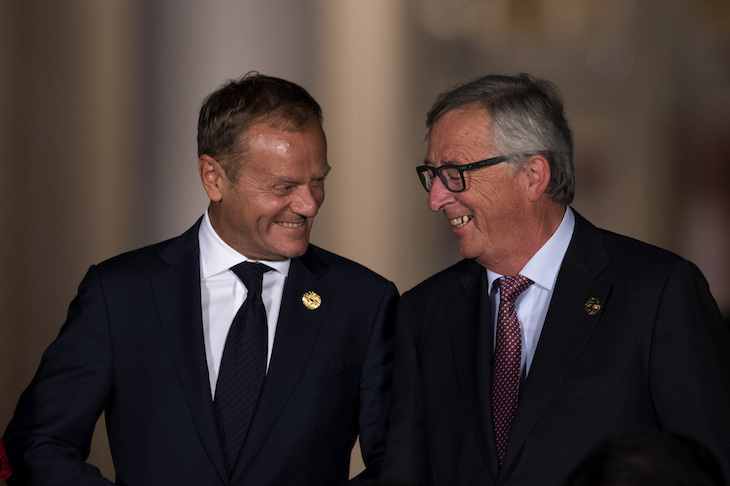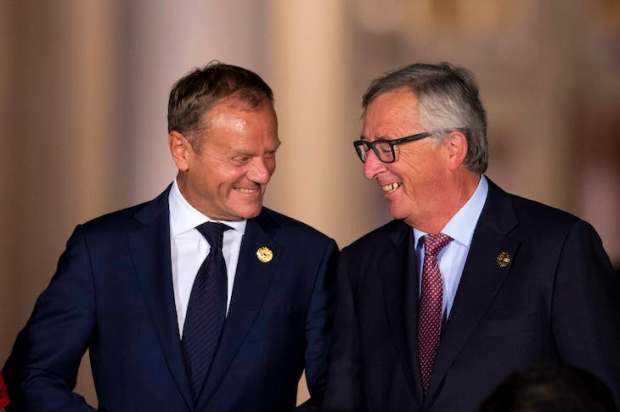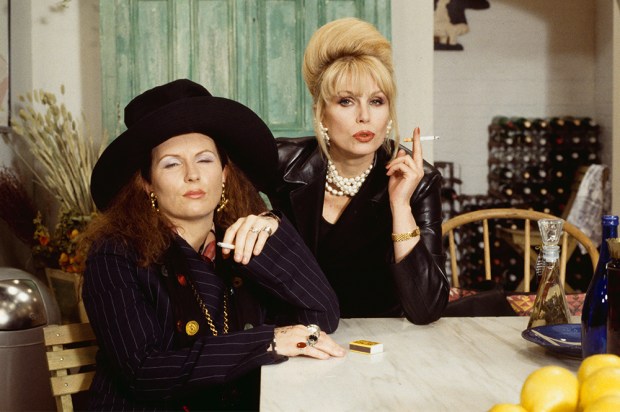Donald Trump was gushing about one European leader in his Times interview this week. But it was the wrong one. The President-elect told me that he was delighted that he’d been congratulated on his election by the ‘very fine gentleman’ who was the ‘head of the European Union’. ‘Mr Juncker?’ I ventured. ‘Ah, yes,’ he replied. Inaccurately as it turns out. For the European president who’d rung to congratulate the American president-elect was not the European Commission president, Jean-Claude Juncker, but the European Council president Donald Tusk. Many of my colleagues will, I’m sure, regard Mr Trump’s error as proof of the folly of electing an unschooled barbarian to the White House. I think it says rather more about the problem of having five different, unelected presidents of the EU.
The Donald’s confident prediction that other countries would now follow Britain out of the EU has been roundly rejected by the continent’s commentating classes as pure mischief-making. But Europe’s south seceding now would make much more sense, and be infinitely more morally justifiable, than America’s South leaving the Union in 1861. The euro is responsible for levels of youth unemployment in Greece, Spain and Portugal worse than anything we’ve seen since the 1930s. The only growth those economic policies have fostered is support for Trotskyists and Nazis. I don’t know about leaving the EU, but if those countries had never joined the euro their economies would be more competitive, their societies more equal and their politics less toxic. That’s what Trump would appear to prefer. But it’s what Nick Clegg and Ed Miliband instinctively oppose. And they wonder why working-class voters desert the liberal left.
Even more curious to me is how my left-wing friends respond to economic overtures from the US. When Barack Obama threatened this country by saying during the referendum campaign that Britain would be at the back of the queue for future trade deals if we voted to leave the EU, there was no anger at such a display of imperial arrogance. Instead there was an almost orgasmically intense sigh of pleasure from the core Remain constituency of public law barristers, BBC executives and academic economists. They appeared to want Britain to suffer as much as possible for daring to make its own declaration of independence. I don’t know what the precise term is for someone who actively wants their country to be punished for asserting its own autonomy, but until the professionals pronounce on what scientific phrase I should use I’ll just rely on traditional descriptions like ‘Guardian reader’.
By contrast, when Donald Trump said he’d like to secure a trade agreement with a post-Brexit Britain as quickly as possible, it was regarded like an inappropriate pass on a first date — the clumsy lunge of a beast who thought his superior weight would secure mute acquiescence. Any independent observer would ask why do the commentating classes admire a Democrat president for saying he wants to frustrate free trade with Britain, then pour scorn on a Republican president who says he wants to enhance free trade with the UK? Simples. As we’ve all discovered over the last century, for the left the purity of their ideology matters far more than anyone else’s liberty or prosperity.
Or indeed factual accuracy. The editor of this great magazine was kind enough last week to point out that one of the most notorious quotations attributed to me was, in fact, a misquotation. It has been widely asserted that I pronounced during the EU referendum that the British people had ‘had enough of experts’ in a proclamation of proud know-nothing, anti-intellectual, to-hell-with-the-facts populism. As Fraser explained, however, the point I made was rather different. I was critical specifically of experts from ‘organisations with acronyms who’d got things consistently wrong in the past’ — i.e., the IMF, IFS and various other economic prognosticators. The IMF got the euro wrong, the referendum wrong and pretty much everything in between wrong but, to be fair, it’s had the good grace to admit it in the last few months. No such grace from those who have used the quote, wrenched out of context and turned on its head, to say the Leave campaign was driven by disdain for patient reasoning and scrupulosity with the facts. The irony that these people are themselves choosing to twist the truth to make a political point seems, like so much else, totally lost on them.
The brilliant New York Times columnist Ross Douthat wrote recently that people seeking to make sense of the Trump victory by searching out books on working-class disaffection may be looking in the wrong place. That’s not to say that memoirs like J. D. Vance’s Hillbilly Elegy aren’t insightful and moving, he explained, it’s just that the really interesting story of the Trump victory isn’t the revolt from below in 2016, but the failure of the establishment since 2008. Indeed perhaps since 1990. He thought Christopher Lasch’s prescient 1995 book The Revolt of the Elites and the Betrayal of Democracy was a good primer. But who can provide a contemporary update? It sounds like the ideal next project for our finest living journalist — Charles Moore — when he completes his magisterial life of the one leader who more than anyone inspired, rather than embodied, elitist condescension: Margaret Thatcher.
Got something to add? Join the discussion and comment below.
Get 10 issues for just $10
Subscribe to The Spectator Australia today for the next 10 magazine issues, plus full online access, for just $10.
You might disagree with half of it, but you’ll enjoy reading all of it. Try your first month for free, then just $2 a week for the remainder of your first year.














Comments
Don't miss out
Join the conversation with other Spectator Australia readers. Subscribe to leave a comment.
SUBSCRIBEAlready a subscriber? Log in